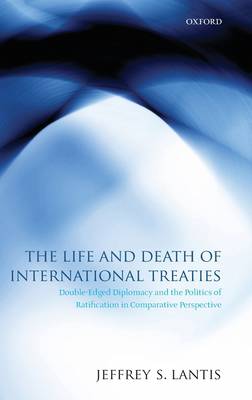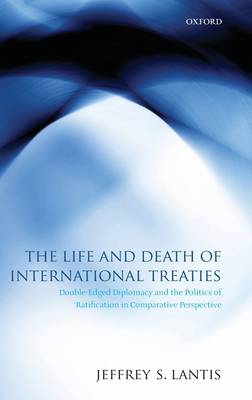
Door een staking bij bpost kan je online bestelling op dit moment iets langer onderweg zijn dan voorzien. Dringend iets nodig? Onze winkels ontvangen jou met open armen!
- Afhalen na 1 uur in een winkel met voorraad
- Gratis thuislevering in België vanaf € 30
- Ruim aanbod met 7 miljoen producten
Door een staking bij bpost kan je online bestelling op dit moment iets langer onderweg zijn dan voorzien. Dringend iets nodig? Onze winkels ontvangen jou met open armen!
- Afhalen na 1 uur in een winkel met voorraad
- Gratis thuislevering in België vanaf € 30
- Ruim aanbod met 7 miljoen producten
Zoeken
Life and Death of International Treaties
Double-Edged Diplomacy and the Politics of Ratification in Comparative Perspective
Jeffrey S Lantis
Hardcover | Engels
€ 185,45
+ 370 punten
Omschrijving
This book represents one of the first comparative studies of international treaty ratification processes in multiple issue areas. The study sets out to fill a gap in political science scholarship by investigating the role that international and domestic political actors and conditions play in the critical, post-commitment phase of cooperation. The book employs the comparative case study method, drawing on original research, elite interviews, and discursive analyses of government documents in Europe, Australia, and North America. Cases examine a select number of treaties on trade cooperation, the environment, European integration, and the nuclear non-proliferation regime. The book concludes that norms and executive strategies play an especially significant role in shaping ratification outcomes. The study has implications for theories of international negotiation and foreign policy analysis as well as the practice of diplomacy.
Specificaties
Betrokkenen
- Auteur(s):
- Uitgeverij:
Inhoud
- Aantal bladzijden:
- 268
- Taal:
- Engels
Eigenschappen
- Productcode (EAN):
- 9780199535019
- Verschijningsdatum:
- 15/01/2009
- Uitvoering:
- Hardcover
- Formaat:
- Genaaid
- Afmetingen:
- 160 mm x 239 mm
- Gewicht:
- 566 g

Alleen bij Standaard Boekhandel
+ 370 punten op je klantenkaart van Standaard Boekhandel
Beoordelingen
We publiceren alleen reviews die voldoen aan de voorwaarden voor reviews. Bekijk onze voorwaarden voor reviews.











